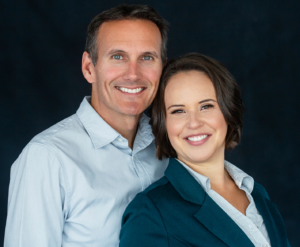Habit #1: Tune In and Talk Openly
Tuning in and talking openly means that if something is really bothering you, respectfully say something about it! Even if it might hurt your partner, even if they may not react well initially.
The pattern of initiating the conversation matters. When you know how to repair (Habit #2), you can be more confident in initiating conversations about things that are bothering you. And if you respect your partner, you’ll trust more that whatever it is they said or did, they had good intentions. If it’s said with that in mind, it will likely come out in a way where they will want to hear how you feel. All the other Habits are tied into this one, which is why we put it as #1!
The bottom line is that holding on to something negatively impacts the end, often leading to resentment or mistrust. Losing trust in your partner or them losing trust in you because you chose to hold back is a slippery road that can be extremely hard to navigate.
The key here, after you’ve decided to share what’s upsetting you, is to do it in a way that will increase your partner’s chances of being able to respond to you. This is where “understanding your negative communication patterns” from Habit #3 comes in again. The more you understand your arguments, the more you can be conscious of bringing things up with your partner without creating problems.
The more you tune into your own feelings, express them, and focus less on your partner’s behaviour, the greater your chance of success and re-connection.
At the beginning of a relationship, couples usually don’t have to practice this “Habit” too much. Talking openly just seems to happen naturally because there have not been many experiences in the relationship that created fear or scars yet. And when they do, the issues may not be so big. But then, as you add years of stressful life events, pain and disappointments, Habit #1 becomes pivotal. If we don’t talk openly and learn how to tune in with each other, we simply won’t last.
Tips on How to Tune In and Talk Openly
Remember that if you want to be trusted by your partner, you need to trust them, too. And the most important way to show trust is to take the risk of sharing your true feelings with your partner and give them the benefit of the doubt that they will try their best to hear you. Why is this so difficult for us to do? Because emotions make us feel so vulnerable, and most of us are uncomfortable being vulnerable.
But remember, if you don’t take this risk to show vulnerability, you will never achieve that deeper level of connection and trust with your partner. It just can’t be accomplished any other way. If you can’t be vulnerable with your partner, with whom can you be vulnerable? It has to start with your partner. Do this for you and do this for your relationship. If this is too hard to do on your own, get help from a therapist. Visit our website to see the couples counselling option and other courses and live events we have for couples.
When you are taking this risk to open up, remember to think of how you do this. Tune in deeply to your own softer feelings first. Ask yourself, “What am I most afraid of?” The answer is usually around a fear of rejection or abandonment for most people. It’s a common fear. And on the flip side of that, ask yourself, “What am I longing for?” Are you longing for support? Connection? Understanding? Growth? To be seen?
Sometimes our past insecurities show up here. If so, it’s important to recognize, acknowledge and be okay with this. Tuning in will help you express yourself in a more authentic way, and you will become more accessible and real to your partner. Then they will be able to tune into you more and offer you the reassurance you need.
It’s beautiful when this happens, and witnessing this level of connection is the very best part of working with couples! Hopefully, this blog is an entry point for you to continue your own journey to improve your relationship and become a Happy Couple.
So don’t hesitate to touch base with us to see if there is any way we can support you and your partner as you work toward improving your relationship!








